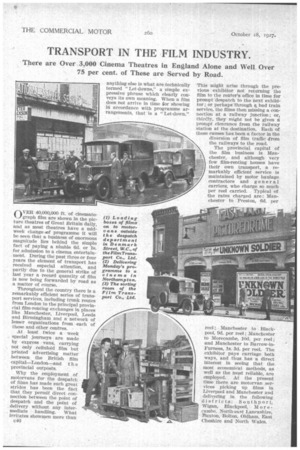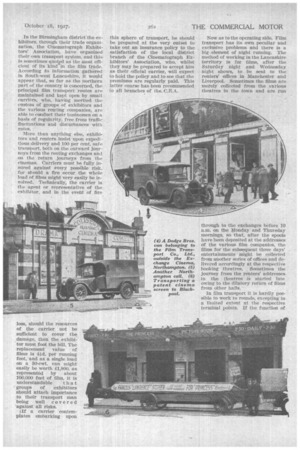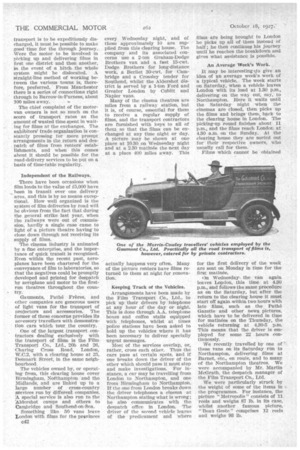TRANSPORT IN THE FILM INDUSTRY.
Page 62

Page 63

Page 64

If you've noticed an error in this article please click here to report it so we can fix it.
There are Over 3,000 Cinema Theatres in England Alone and Well Over 75 per cent. of These are Served by Road.
d'A VEIL 40,000,000 ft. of cinematokJgraph film are shown in the picture theatres of Great Britain daily, and as most theatres have a midweek change øf programme it will be seen that a business of enormous magnitude lies behind the simple fact of paying a nimble 6d. or 1s. for admission to a cinema entertainment. During the past three or four years the element of transport has received especial attention, and partly due to the general strike of last year a record quantity of film is now being forwarded by road as a matter of course.
Throughout the country there is a remarkably efficient series of transport services, including trunk routes from London to the principal provincial film-renting exchanges in places like Manchester, Liverpool, Leeds and Birmingham and a network of lesser organizations from each of these and other centres. , At least twice a week special journeys are made by express vans, carrying not only celluloid film but printed advertising matter ,between the British film capital—London—and t h e provincial outposts.
Why the employment of motorvans for the despatch of films has made such great strides has been the fact that they permit direct connection between the point of despatch and the point of delivery without any inter,mediate handling. What irritates showmen more than c40 anything else is what are technically termed "Let-downs," a simple expressive phrase which clearly con, veys its own meaning. When a film does not arrive in time or showing -in accordance with programme arrangements, that is a "Let-down." This might arise through the previous exhibitor not returning the film to the renter's office in time for prompt despatchto the next exhibitor ; or perhaps through g bad train service, the films then missing a connection at a railway junction; or, thirdly, they might not he given a prompt clearance from the railway station at the destination. Each of these causes has been a factor in the diversion of film traffic Ifrom the railways to the road.
The provincial capital of the film business is Manchester, and although very few film-renting houses have their own transport, a remarkably efficient service is maintained by motor haulage contractors and gene r al carriers, who charge so much per reel carried. Typical of the rates charged are: Manchester to Preston, 6d. per reel ; Manchester to Blackpool, 9d. per reel ; Manchester to Morecambe, 10d. per reel; and Manchester to Barrow-inFurness, Is. Sd. per reel. The exhibitor pays carriage both ways, and thus has a direct interest in seeing that the most economical methods, as well as the most reliable, are employed. At the present time there are motorvan services picking up .films in Liverpool and Manchester and delivering in the following districts: Southport, Wigan, Blackpool, Morecambe, North-east Lancashire, Buxton, Bolton, Oldham, East , Cheshire and North Wales. In the Birmingham district the ex. hibitors, through their trade organization, the Cinematograph Exhibitors' .Association, have organized their own transport system, and this is sometimes quote as the most efficient: of its kind in the film trade. According to information gathered in South-west Lancashire, it would • appear that, so far as the northern part of the country is concerned, the principal film transport routes are maintained and kept open by small carriers, who, having merited the custom a groups of exhibitors and the various renting companies, are able to conduct their businesses on a basis of regularity, free from traffic fluctuations and disturbances with rates.
More than anything else, exhibitors and renters, insist upon expeditious delivery and 100 per cent. safe transport, both on the outward journeys from the renting exchanges and on the return journeys from the cinemas. Carriers must he fully insured against every possible risk, for should a fire occur the whole load of films might very easily he involved. Technically, the carrier is the agent or representative of the exhibitor, and in the event of fire loss, should the resources of the carrier not be sufficient to cover the ,damage, then the exhibitor must foot the bill. The replacement value of fal1IS is 41d. per running foot, and as a single load on a 30-cwt. van might easily be worth £1,800, as represented by about 100,000 feet of film, it is understandable that groups of exhibitors should attach importance to their transport man being well• covered 'against all risks.
4If a carrier contemplates embarking upon this sphere of transport, he should be prepared at the very outset to take out an insurance policy to the satisfaction of the local district branch of the Cinematograph Exhibitors' Association, who, whilst they may he prepared to accept him as their official Carrier, will expect to hold the policy and to see that the premiums are regularly paid. This latter course has been recommended to all branches of the. C.E.A. Now as to the operating side. Film transport, has its own peculiar and exclusive problems and there is a big element of night running. The method of working in the Lancashire territory is for films, after the Saturday night and Wednesday night shows, to be sent to the renters' offices in Manchester and Liverpool. Sometimes the films are merely collected from the various theatres in the town and are run
through to the exchanges before 10 a.m. on the Monday and Thursday mornings, so that, after the spools have been deposited at the addresses Of the various film companies, the films for the subsequent three days' entertainments might be collected from another series of offices and delivered accordingly at the respective booking theatres. Sometimes the journey from the renters' addresses to the theatres is started late owing to the dilatory return of .films from other halls.
In film transport it is hardly possible to work to rounds, excepting to a limited extent at the respective terminal points. If the function of
transport is to be expeditiously discharged, it /oust be possible to make good time for the through journey. Were file motor to be involved in picking up and delivering films in first one district and then another, it the event of a hitch the whole system might be dislocated. A straight-line method of working between the various towns is, therefore, preferred. From Manchester there is a series of connections right through to Barrow-in-Furness, about 100 miles away.
The chief complaint of the motorvan owners is not so much on the score of transport rates as the amount of wasted time spent in waiting for films at the exchanges. The exhibitors' trade organization is constantly pressing for more prompt arrangements in the return and despatch of films from renters' establishments, and when this comes about it should be possible for the road-delivery services to be put on a basis of time-table regularity.
Independent of the Railways.
There have been occasions when film loads to the value of £5,000 have been in transit over one delivery area, and this is by no means exceptional. How well organized is the system of film deliveries by road will be obvious from the fact that during the general strike last year, when the railways were out of commission, hardly a single case came to light of a picture theatre having to close down through not receiving its supply of films.
The cinema industry is animated by a fine enterprise, and the importance of quick transit is recognized. Even within the recent past, aeroplanes have been chartered for the conveyance of film to laboratories, so that the negatives could be promptly developed and printed for despatch by aeroplane and motor to the firstrun theatres throughout the country.
Gaumonts, Pathe Freres, and other companies are generous users of light vans for the transport of projeciors and accessories. The former of these concerns provides its aceessory travellers with demonstration ears which tour the country.•
One of the largest transport contractors dealing exclusively with the transport of films is the Film Transport Co., Ltd., 20b and 26, Charing Cross Road, London, W.C.2, with a clearing house at 25, Denmark Street, in the same neighbourhood.
The vehicles owned by, or operating-from, this clearing house cover Birmingham, Northampton and the Midlands, and are linked up to a large number of cross-country services run by different companies. 'A special service is also run to the 'Aldershot camps and others to Cambridge and Southend-on-Sea.
Something like 50 vans leave London with films for the prsvinces
e42 every Wednesday night, and of these approximately 10 are supplied from this clearing house. The company and its associated concerns use a 2-ton Graham-Dodge Brothers van and a fast 15-cwt. Dodge Brothers for long-distance work, a Berliet 30-cwt. for Cambridge and a Crossley tender for Southend, whilst the Aldershot district is served by a 1-ton Ford and Greater London by Cubitt and Napier vans.
Many of the cinema theatres are miles from a railway station, but it is, of course, essential for them to receive a regular supply of films, and the transport contractors are furnished with keys to all of them so that the films can be exchanged at any time night or day. A picture may be shown at one place at 10.30 on Wednesday night and at a 2.30 matinee the next day at a place 400 miles away. This actually happens very often. Many of the picture renters have films returned to them at night for renovation.
Keeping Track of the Vehicles.
Arrangements have been made by the Film Transport Co., Ltd., to pick up their drivers by telephone at any hour of the day or night. This is done through A.A. telephone boxes and coffee stalls equipped with telephones, whilst at times police stations have been asked to hold up the vehicles where it has been necessary to deliver specially urgent messages.
Most of the services overlap, or, rather, cross each other. Thus the cars pass at certain spots, and if one breaks down the driver of the other which should pass it must stop and make investigations. For instance, a car may be travelling from London to Northampton, and one from Birmingham to Northampton. If the one from London breaks down the driver telephones a cinema at Northampton stating what is wrong; he also communicates with the despatch office in London. The driver of the second vehicle learns of the predicament and where
films are being brought to London he picks up all of them instead of hale; he then continues his journey until lie reaches the breakdown and gives what assistance is possible.
An Average Week's Work.
It may be interesting t,to give an idea of an average week's work of a typical vehicle. The week starts on Saturday, when a vehicle leaves London with its load at 1.30 p.m., delivering on the way out, say, to Northampton. Here it waits until the Saturday night when the cinemas are closed, then picks up the films and brings them_ back to the clearing house in London. The picking-up round finishes about 11 p.m., and the films reach London at 4.30 a.m, on the Sunday. At the clearing house they are sorted out for their respective owners, who usually call for them.
Films which cannot be obtained for the first delivery of the week are sent on Monday in time for the first matinee.
On Wednesday the van again leaves London, this time at 4.30 p.m., and follows the same procedure as on the Saturday, but after the return to the clearing house it must start off again within two hours with late films, such as the Pathe Gazette and other news pictures, which have to be delivered in time for matinees on the Thursday, the vehicle returning at 4.30-5 p.m. This means that the driver is employed for some 22 hours continuously.
We recently travelled by one of ' these vans on its Saturday run to Northampton, delivering films at Barnet, etc., en route, and to many of the Northampton theatres. We were accompanied by Mr. Martin McGrath, the despatch manager of the Film Transport Co., Ltd.
We were particularly struck by the weight of some of the items in the programmes. For instance, the picture " Metropolis " consists of 11 reels and weighs 87 lb. in its ease, whilst another famous picture, "Beau Geste " comprises 12 reels and weighs 93 lb.












































































































